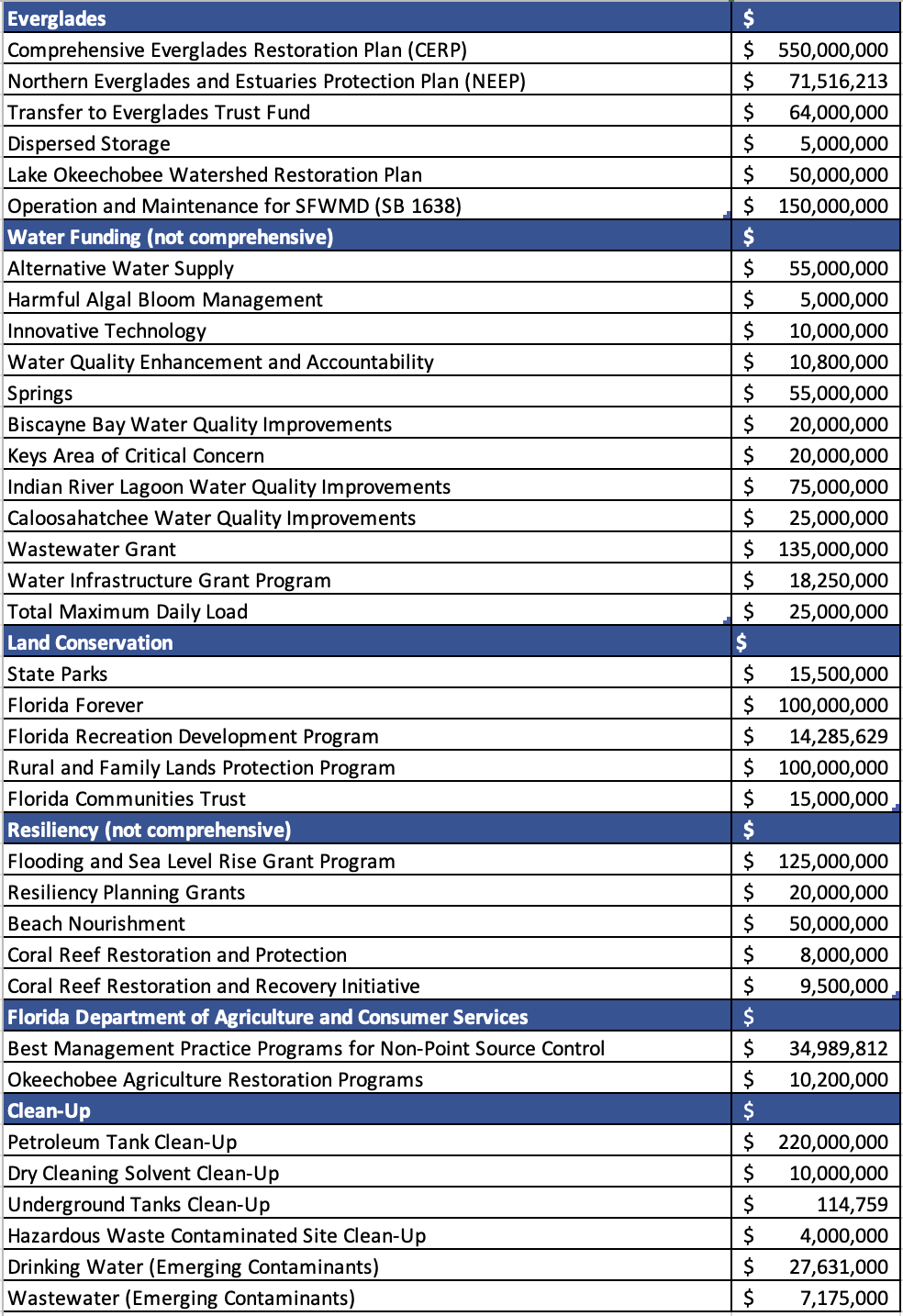On Friday, March 8, the 2024 Legislative Session officially came to a close. As you can see from this longer-than-usual update, a lot has happened in a few short weeks!
From conservation funding to the much-awaited updated stormwater rule, to flood disclosure requirements—a first for our flood prone state—to fines for the intentional release of balloons, the 2024 session tackled a host of environmental issues. Audubon Florida’s policy team worked overtime to stay on top of worrisome bills, collaborate with elected officials on bill language and amendments, and keep our stakeholders up to date.
As we acknowledge high levels of funding for water and Everglades restoration, coastal resiliency, and land conservation, we also understand that we cannot fix problems with funding alone. We need legislative action that will strengthen our regulatory programs to reduce nutrients flowing into our waterways, discourage urban sprawl, and more.
Still, we take this moment to celebrate the good bills that made it across the finish line, and the bad bills we stopped in their tracks. Read on for details and thank you for lending your voice to make these successes possible.
Budget Update
The Governor signed a $116.5 billion budget for the coming fiscal year, the only bill they are required to pass during the legislative session. The budget sets aside $10 billion in reserves, and $500 million for a state Emergency Preparedness and Response Fund. It also includes more than $740 million for Everglades restoration (not including funds from SB 1638).
See details below.

Good Bills That Passed
HB 321, Release of Balloons, by Rep. Chaney (R-St. Pete Beach), prohibits the intentional release of balloons inflated with a gas lighter than air. When balloons are released, they drift away, eventually becoming litter, which can be dangerous to wildlife and the environment. The bill was amended to exempt persons six years of age or younger from penalties related to the prohibition.
HB 1049, Flood Disclosure in the Sale of Real Property, by Rep. Hunschofsky (R-Parkland), requires property owners to disclose to prospective buyers not just if they are in a flood-prone area but also whether the property has been damaged by flooding, whether flood-insurance claims have ever been filed, and whether owners had ever received federal assistance for flood damage. More states are requiring homeowners to disclose a property’s flood risk and history when they sell it. This bill provides transparency and holds sellers accountable for representing their properties in good faith.
SB 7040, Ratification of the Florida Department of Environmental Protection’s Rules Relating to Stormwater by the Environment and Natural Resources Committee and Sen. Harrell (R-Stuart). Excess nutrients are the leading cause of declining water quality in our springs, lakes, groundwater, and more. Florida’s existing stormwater rules are more than forty years old and are simply not protective enough. The new rule, while more protective, provides flexibility in stormwater infrastructure choices, looking towards innovations like green infrastructure and low impact development options to meet permit requirements. Audubon has been engaged every step of the way working to minimize the impacts of many of the proposed amendments. While this final rule is a compromise and far less protective than what we would have liked to see, Audubon believes it is worth supporting because it is better than what we currently have.
HB 1557, Department of Environmental Protection, by Rep. Chaney (R-St. Pete Beach), is a comprehensive bill that includes provisions that will impact consumptive use permitting, reclaimed water use, and resilience planning; provides better protections for seagrass in aquatic preserves; and establishes the Kristin Jacobs Coral Reef Ecosystem Conservation Area as a new aquatic preserve. The bill also includes good language expanding the list of regional entities allowed to receive funding for local resilience efforts to include regional planning councils and estuary partnerships. These entities are critical in regional planning efforts and work extensively with local governments making them a logical conduit for resilience funding.
The bill includes a good provision requiring wastewater within areas with water quality concerns (BMAP or RAP areas) to be treated to higher standards if it is to be reused (for irrigation or similar uses) as reclaimed water. This will help ensure that the benefits of reclaimed water are not undermined by nutrient problems—a move we would like to see expanded to cover all applications of reclaimed water throughout the state.
SB 1638, Environmental Resource Management, by Sen. Hutson (R-St. Augustine. The bills require 96 percent of the revenue share payments received under the agreement between the Seminole Tribe and the State of Florida in 2021 be appropriated for land conservation, the management of conservation lands, resilience projects, and water quality improvement projects.
Good Bill That Did Not Pass
SB 1364, Everglades Protection Area, by Sen. Calatayud (R-Miami), would have provided that any proposed changes to a local government’s comprehensive development plan, within a two-mile development-free buffer zone to protect the Everglades, must undergo Florida’s coordinated review process rather than the expedited process. The intent of the bill is to protect the Everglades from encroaching development. Unfortunately, this good bill did not make it through all its referenced committees in the House. With so much invested in Everglades restoration it is critical that we protect and prevent encroachment around the Everglades Protection Area boundary.
Concerning Bills That Did Not Pass
SB 738, Environmental Management, filed by Sen. Burgess (R-Zephyrhills), started out as a bill focusing on the side slope design requirement of a 4:1 horizontal-to-vertical ratio for stormwater ponds that is accessible to the general public and is in or adjacent to residential or urban areas. It included requirements that the side slope must be stabilized with vegetation to prevent erosion and provide for pollutant removal.
However, the bill also included several bad provisions; among them was language that said “the prevailing party in challenges against the Florida Department of Environmental Protection (DEP) or a water management district to be entitled to reasonable costs and attorney fees,” effectively shutting off citizen engagement in bad agency decisions. Thanks to our team’s targeted hard work and to the advocacy of many others, this language was removed.
The bill also required DEP and each water management district to conduct an unnecessary review of their respective agency’s current coastal permitting processes and other permit programs to identify areas of improvement and to increase efficiency within each process and program. This provision was also removed from the bill.
Note: A bad provision remained in place to the very end. We reported previously that revised rules governing whether an individual may sue over damages to real and personal property (but not environmental harm) from a discharge or other pollution not authorized by government remained in the bill. This language would have prohibited claims for damage to the environment caused by oil spills from drilling, pipelines, and tankers. We are happy to report that while its Senate companion made it all the way through, HB 789 did not make it past the House floor this legislative session and therefore will not be making its way to the Governor.
SB 1210, Estero Bay Aquatic Preserve, by Sen. Martin (R-Ft. Myers), would have revised the boundaries of the Estero Bay Aquatic Preserve to allow a portion of the Estero Bay Aquatic Preserve to be opened up to dredging for a 300-slip marina proposed for that location. This is an egregious violation of the local conservation efforts that put this important ecosystem under protection decades ago. We are very glad to report that this bill did not pass this legislative session.
SB 1620, Surplus Lands, by Sen. Collins (R-Tampa), would have allowed DEP to surplus state-owned conservation land (within the Florida Wildlife Corridor) without development rights for agricultural use and dedicate the proceeds to FDACS to purchase development rights on other agricultural properties through the Rural and Family Lands Protection Program. The bill also prohibited any water management districts from including development rights on any surplus lands they sell. There was an unsuccessful attempt to amend this bill onto the Florida Department of Agriculture’s agency bill. This bill also did not pass this legislative session.
HB 1221, Land Use and Development Regulations, by Rep. McClain (R-Ocala), and its Senate companion, SB 1184, by Sen. Ingoglia (R-Springhill), would have almost completely eliminated provisions controlling “urban sprawl” by removing the substantive language from the longstanding definition of “sprawl.” Other parts of the bill required local governments to avoid planning around “community goals and vision” and instead would have required them to look primarily to calculations of how many houses, duplexes, and townhomes would be necessary to provide housing under anticipated future population estimates. With regard to population estimates, the bill required local governments to plan for providing housing for the highest available estimates of future population growth. Lands set aside as rural or farmland preservation areas within comprehensive plans would not be protected at all.
As originally drafted, HB 1221 included a section on “agricultural enclaves,” making it easier for developers to force local governments to allow housing development within remaining areas of farmland. That section was removed from the bill by an amendment offered by the bill’s sponsor. Audubon is glad that bills such as these that encourage urban sprawl did not make it to the finish line.
Bad Bills That Passed
SB 632, by Sen. Simon (R-Tallahassee), creates the “Self Defense Act.” This broadly written bill exempts individuals from administrative, civil, or criminal penalties for using lethal force against bears to prevent imminent threat of death, serious injury to persons or pets, or substantial damage to dwellings, provided no lure was used to attract the bear.
The State of Florida’s constitution grants the Florida Fish and Wildlife Conservation Commission (FWC) the regulatory and executive powers of the state concerning wild animal life. Audubon strongly believes FWC, as the experts, should be the leaders in addressing the growing problem between human and bear populations, not badly written legislation that could result in unintended consequences and not address the underlying problem.
Audubon asked Governor DeSantis to veto SB 632 on the grounds that it is unconstitutional. He still signed the bill.
HB 1645, Energy Policy, by Rep. Payne (R-Palatka) reforms energy policy and infrastructure in Florida with a focus on natural gas and electric utilities. The bill unfortunately repeals previously established renewable energy targets, sections relating to the Florida Energy and Climate Protection Act, as well as renewable energy grants, effectively removing programs aimed at fostering renewable energy and conservation. HB 1645 reduces regulations on natural gas pipelines, prohibits local governments from regulating the location of natural gas storage facilities, and eliminates the requirement for state agencies and local governments to consider fuel efficiency when purchasing vehicles.
The bill also prohibits wind energy and transmission in Florida waters. While wind technology must be sited appropriately to avoid bird impacts, it will likely be an important part of our clean energy transition in future years, as turbine technology improves to harness the lower wind speeds more common in Florida.
However, the bill also implements several studies and assessments regarding the security and resilience of the state's electric grid and natural gas facilities, the feasibility of advanced nuclear power technologies, and the potential for hydrogen fueling infrastructure development. Hydrogen has the potential to help with storage of renewably generated energy.




